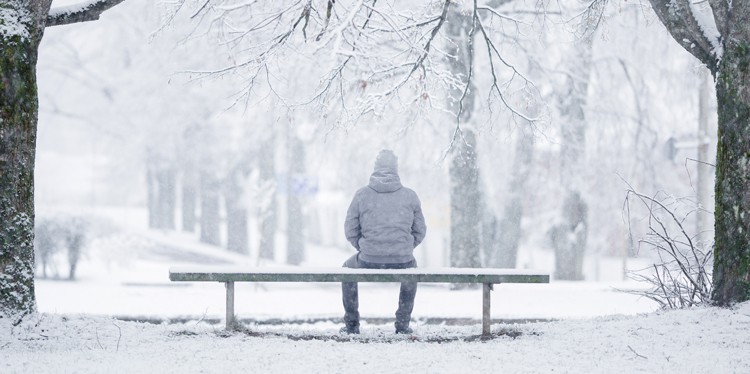Grieving during the holidays – the 4 R’s

Adapted from National Hospice & Palliative Care Organization Bereavement Professionals Chat, Grief Support and the Holidays, Kara Thoma, LCSW, ACHP-SW, Joelle Osterhaus, LCSW, ACHP-SW, October 2021.
The holidays are an emotional and often stressful time for most of us, which are often further intensified for the bereaved. As time approaches, dread, anxiety, and worry can wash over us, filling our hearts and minds. We may feel isolated because during a time when others are “merry,” we may not feel merry at all to the point where it feels like no one understands. Others may want to keep things exactly as they used to be. It can feel like the progress we made with our grief takes ten steps back. How can the bereaved enjoy the holidays while also grieving? The four R’s can serve as a guide.
Relax
During the holidays, it’s okay to take a break from your grief, move it aside, and try to enjoy the holiday. We don’t forget our loved ones by doing so, and it is a healthy way to cope. Go a slower pace (amidst the chaos of the holiday) and respect your own limits. As you put the pieces of your life together again, give yourself permission to adapt how you celebrate this season.
Re-orient
Acknowledge that the loss affects this holiday, this gathering, and this time of the year, and that things will never be the same again. What feels most right to you? Share those feelings with your circle of support. Acknowledge the year of “lasts,” i.e. last year we did this, had this event, we have always done this… and that things will likely be different from here on out. Re-orient by keeping things simple, especially for the first holiday after your loved one’s death.
Rely
Who is your support network? Are you able to reach out to this group during the holidays? Are there other ways you can get support at this time? It can be tempting for you to isolate. Instead, find one or two individuals you can share your feelings with, particularly around the holiday. When you open yourself up and allow yourself to be vulnerable, it allows others to support you. Family and friends will appreciate your transparency instead of having to assume or guess at how you are feeling and what you’d like to do.
Remember
Families remember their loved ones in their own unique ways: One family goes bowling on the anniversary of the death as a way to remember their loved one and his favorite sport. Another family sets an empty chair/ place at the table. Others might serve certain types of foods the deceased enjoyed. You can take walks, bike, and hike to special places. You might even consider making a wreath or candle to light.
There may be fatigue followed by surges of grief. Music, smells and rituals will flood us with memories. You might even feel joy at times with grief as your backdrop. It’s okay to not be okay and, conversely, it’s okay to be okay, even for moments here and there.
When to seek help
Though extremely painful, most people experience the intensity of grief gradually lessen as they adapt to loss. Adaptation does not happen all at once. It takes time and can occur in fits and starts. The timeline for this process is different for everyone. In general, acute grief might last anywhere from weeks to several months. However, for some, the process of adapting can be derailed and the intensity of grief can remain high. This is the condition referred to as “complicated grief” or “Prolonged Grief Disorder.” Here are some of the things that can derail the healing process if you are experiencing them frequently:
- Maladaptive thoughts
-
- Catastrophizing (believing that the worst is going to happen)
- Ruminating (going over a thought without completion)
- “If-only” thoughts (“Monday morning quarterbacking”; thinking too much about what could have been different)
- Dysfunctional behaviors and bodily reactions
- Avoiding reminders that this person is gone, such as the burial site or objects of the deceased
- Avoiding people who remind the person that their loved one is gone
- Disrupted healthy eating, exercise, and social contact
- Attempting to escape from the painful reality of the loss by spending excessive time with mementos of the deceased
- Physical pain
- Emotional dysregulation
- Difficulty managing painful emotions
- Irregular sleeping patterns
- Feeling unable or unwilling to experience positive emotions
Remember that these thoughts, feelings, behaviors, and bodily reactions are normal during grieving, but if you find yourself focusing on them frequently, you should seek professional mental health support. Find resources for grief support.
About the author
 Julia Rajtar is a Board Certified Chaplain who has worked in hospitals and senior living communities, currently serving as Bereavement Coordinator with Hennepin Healthcare Hospice. She is a member of the Minnesota Coalition for Death Education and Association for Death Education and Counseling.
Julia Rajtar is a Board Certified Chaplain who has worked in hospitals and senior living communities, currently serving as Bereavement Coordinator with Hennepin Healthcare Hospice. She is a member of the Minnesota Coalition for Death Education and Association for Death Education and Counseling.

